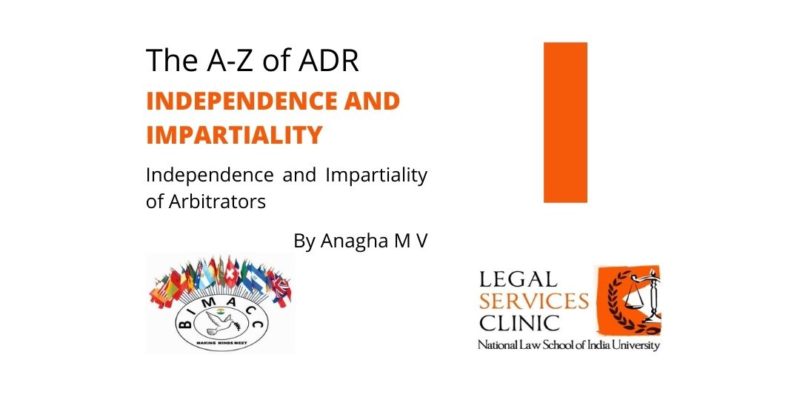
A-Z of ADR: Independence and Impartiality of Arbitrators
-Anagha M V (III Year, NLSIU Bangalore)
Party autonomy in choosing the procedure for dispute resolution is one of the foundational pillars of Alternate Dispute Resolution (ADR). This autonomy includes the power to appoint the arbitrators who will help both the parties resolve their disputes. While any number of arbitrators can be appointed, parties generally agree to appoint one or three arbitrators (the number of arbitrators should be an odd number, to ensure that there is no tie in the final award).[1] Since the entire weight of a proceeding is on the person/persons who are acting in the role of a judge, it is said that an arbitration is only as good as the arbitrators. The choice of composition of the arbitral tribunal is vital and is one of the most decisive factors of an arbitration.[2] Thus, parties must ensure that the arbitrators appointed by them are neutral, impartial and independent. They must be capable of assessing the case before them in an unbiased and fair manner. This is the only way in which the efficiency and effectiveness of arbitration proceedings can be maintained and lead to the successful and fair resolution of disputes.
Impartiality vs. Independence:
Impartiality and independence are the two most frequently used terms in relation to the appointment of arbitrators and it is important to note the distinction between them. Independence means that the arbitrator has no personal interest in the case i.e., he will not win or lose in any way based on the outcome of the case. Impartiality, on the other hand, means that the arbitrator affords both the parties an equal opportunity to present their case and make arguments. This implies that an arbitrator may be independent but not impartial and vice versa. For the appointment of an arbitrator to be valid, he/she must be both independent and impartial.
The Honourable Supreme Court, in the case of M/S Voestalpine Schienen GmbH v. Delhi Metro Rail Corporation Ltd,[3] analysed the difference between the two concepts. They held that the independence of the arbitrator can generally be ascertained even before the arbitration proceedings begin, based on the information disclosed by him/her. For example, if there arises a dispute between two companies, the CEO of one of the companies will not be an independent arbitrator, since he has a personal interest in the matter and will, in all probability, rule in favour of his own company. This fact of his independence is ascertainable even before the proceedings begin. Partiality, however, surfaces during the arbitration proceedings. An arbitrator is said to be partial when he/she does not give both the parties an equal chance to make their arguments and lets one side dominate the entire proceedings.[4]
The court held that both independence and impartiality are the hallmarks of arbitration proceedings and if even one of the hallmarks is not met, the arbitrator becomes ineligible to conduct the proceedings.[5]
Apparent vs. Actual Bias:
The concept of having independent and impartial arbitrators/mediators stems from the rule against bias, which applies to all judicial and quasi-judicial proceedings. The rule against bias strikes against the factors which improperly influence a judge while arriving at a decision. Bias can be divided into two categories, apparent and actual, based on the manner in which it manifests itself. Actual bias denotes a situation where it can be shown that a judge has been influenced or has been prejudiced while reaching a decision whereas apparent bias denotes the existence of circumstances which indicate that the judge may be biased, even if it cannot be proved.[6]
Under the Arbitration and Conciliation Act of 1996, there was no express bar on appointing arbitrators who might have had an apparent bias. This led to situations where, for example, the head of a government department himself could sit as the arbitrator to decide matters relating to his department. In the case of Indian Oil Corporation v. Raja Transport (P) Ltd.,[7] the Supreme Court observed that senior officers of government corporations will be considered to be independent and impartial and will not be barred from functioning as arbitrators merely because their employer is a party to the contact. The judges have adopted a pro-arbitration stance by using this line of reasoning and it still holds good for arbitration proceedings that have been initiated before 2015.
Independence and Impartiality under the 2015 Arbitration and Conciliation (Amendment) Act:
The error of not recognising apparent bias has been rectified by way of the 2015 Amendment to the Arbitration Act. Section 12 of the amended Act states that any person who is approached to be an arbitrator in a particular case has to disclose any direct or indirect relationship with the parties or in relation to the subject matter in dispute, which may affect his/her independence or impartiality. The Section reads as follows:
1.When a person is approached in connection with his possible appointment as an arbitrator, he shall disclose in writing any circumstances,
a) -such as the existence either direct or indirect, of any past or present relationship with or interest in any of the parties or in relation to the subject-matter in dispute, whether financial, business, professional or other kind, which is likely to give rise to justifiable doubts as to his independence or impartiality; and
b) which are likely to affect his ability to devote sufficient time to the arbitration and in particular his ability to complete the entire arbitration within a period of twelve months.[8]
The fifth schedule to the Act lays down the circumstances which may give rise to a doubt as to the independence and impartiality of the arbitrator, while schedule seven contains a list of forbidden categories of relationships between the parties and the arbitrators. An employee, legal representative, advisor, close family member, etc., of a disputing party, cannot be appointed as an arbitrator as per these schedules.
If an arbitrator has been appointed contrary to these provisions, or if there is a change in circumstances after the arbitration proceedings have commenced that render an arbitrator ineligible, he can be removed and replaced with a substitute.[9] The only way in which an ineligible party can be made an arbitrator is if both the parties expressly, consensually and with full knowledge about the partiality or lack of independence of the arbitrator, agree to it by way of a contract.[10]
In the recent landmark judgement of Bharat Broadband Network Limited v. United Telecoms Limited, the Supreme Court analysed the procedure of challenging the appointment of an arbitrator under Section 12. A challenge will only be entertained on grounds that were not previously known to the challenging party. A challenge must first be made, within a period of fifteen days of either the tribunal being constituted or the parties becoming aware of the challenging circumstances, before the tribunal itself. If the tribunal sees no merit in the challenge, the proceedings can continue and an award can be granted. If the aggrieved party then still wants to challenge the constitution of the tribunal, the matter can be appealed before a court.[11]
The 2015 amendment thus recognises apparent bias and the damage that it can do to an arbitration proceeding. The Arbitration and Conciliation Act now provides clarity and certainty regarding the pre-requisites of the process of appointing arbitrators. This serves as the first step towards ensuring that arbitrators appointed in India are impartial and independent, so as to further the cause of justice.
[1] Badrinath Srinivasan, ‘Appointment of Arbitrators by the Designate under the Arbitration and Conciliation Act: A Critique’ (3 May, 2014) 49 (18) Economic and Political Weekly 59
[2] Shivani Khandekar and Divyansh Singh, ‘Independence and Impartiality of Arbitrators: Are We There Yet?’ (Kluwer Arbitration Blog, 14 November, 2017) <http://arbitrationblog.kluwerarbitration.com/2017/11/14/independence-impartiality-arbitrators-yet/?doing_wp_cron=1596271681.3660259246826171875000> accessed 1 August, 2020
[3] [2017] SCC OnLine SC 172
[4] M/S Voestalpine Schienen GmbH v. Delhi Metro Rail Corporation Ltd [2017] SCC OnLine SC 172
[5] ibid.
[6] Director General of Fair-Trading v. The Proprietary Association of Great Britain [2001] 1 WLR 700
[7] [2009] 8 SCC 520
[8] The Arbitration and Conciliation Act 1996, s. 12
[9] The Arbitration and Conciliation Act 1996, s. 14
[10] Bharat Broadband Network Limited v. United Telecoms Limited Civil Appeal NO. 3973 of 2019
[11] The Arbitration and Conciliation Act 1996, s. 34
-Anagha M V (III Year, NLSIU Bangalore)
Anagha M V is a third-year student from the National Law School of India University (NLSIU), Bangalore.
BIMACC expresses its gratitude towards the author and to the members of the Legal Services Clinic, National Law School of India University (NLSIU) for their support in our collaborative efforts to promote ADR with this series titled “A-Z of ADR”. The purpose of this series is to increase the understanding of certain fundamental concepts of Alternative Dispute Resolution.
The Legal Services Clinic is a student-run committee that provides free legal services to the socially and the economically backward sections of the society who have difficulty accessing the judicial system. It also has a mandate of spreading legal awareness and providing free legal assistance to those who cannot afford it.
Website: www.legalservicesclinic.org/
Facebook: @legalservicesclinic
Email: lsc.nlsiu@gmail.com
Phone Number: 073586 73214
Disclaimer: The views and opinions expressed in this blog are those of the author and do not necessarily reflect the official policy or position of BIMACC, any of the members of the Board, or the empanelled neutrals. This blog is for informative purpose only and does not constitute legal advice in any manner whatsoever.
